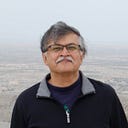They called us exceptional
I just finished reading a book that chronicles the experience of a woman with Indian parents growing up in this country. Titled “They called us exceptional: and other lies that raised us” by Prachi Gupta, it is an interesting read, though a bit too dense and long. It is also a depressing story that ends with her family completely falling apart.
The book is especially relevant to us as we are immigrants from India and raised two kids in this country. I was trying to see how our story matches that of Prachi’s and where it does not, what could be the reasons.
In one important way it does not match is in terms of what has happened to our family vs. Prachi’s. We are an intact family that lives happily in California. Nothing as dramatic as what happened to the Prachi’s in the book. It could be just good luck or there may be reasons.
The main reason for Prachi’s family falling apart is her father, who was authoritarian with old fashioned views of how his wife and children should behave with him. The way he treated his wife, daughter and son is frankly shocking. As the book progresses, we find out that he was also suffering from mental illness.
To elaborate, in many families in India, wives are still second-class citizens. They are there to cook food, bear children, raise them, and be obedient. Also, the fathers demand their children to become doctors, or lawyers, or investment bankers. Those are, in their opinion, the surest ways of making money, and that they believe would lead to happiness. These beliefs come with them as they emigrate to US.
Children are also made to believe that as Indian immigrants, they are exceptional. Unlike the population around them, they have to study hard, ignore any distractions, and become doctors. If they fail to achieve the target professions, they are treated like failures.
Another point that Prachi makes is that as a brown person, she felt like a fish out of water in school and work environment which was mostly white. Surely discrimination exists and one cannot deny how she felt and coped with the situation.
However, there is one point I would like to make in that regard. It appears that Prachi’s parents did not make too much effort to assimilate in America. In other words, they remained “Indians in America” and not become “Americans with an Indian Heritage”.
I am a strong proponent of the latter. By assimilating, while not abandoning your Indian heritage, you can have the best of both worlds. There is so much that this country and immigrants from the other parts of the world have to offer. Different cultures, food, music, and life stories. Doing it also gives you confidence in dealing with people who are not like you. It reduces “them vs us” attitude and you may stop seeing every action by “them” as an indication that it was based on racism, when very likely it was not. That has been my experience.
One caveat. My experience was based on working at high level consulting firms where having people with a variety of backgrounds is common. I am sure the same situation exists in hi-tech firms as well. If you are in a field where those who work are either less educated or live in a more insular world, the situation would be different from what I experienced.
To make it more complex, in some situations, they are looking for an Indian (say, because they want to make a movie about India) and assume that you are an Indian because you look like one, when you really are an American who has parents from India. You get discriminated when they find out that you are too much like them, and not different.
An interesting paradox, isn’t it?
Overall, as immigrants, one of the most important challenges we face is raising our children. While there is no one way to raise them, the attitude we have toward our new country matters a great deal in whether they end up flourishing and being happy.
